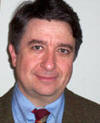|
November 2011
Column
AutomatedBuildings.com
|
[an error occurred while processing this directive]
(Click
Message to Learn More)
|
Planning for Abundance
So what if things did change?
What if distribution and electricity were not the be-all of commercial
and domestic energy?
|
 Toby Considine Toby Considine
TC9
Inc
The New Daedalus
Contributing Editor
|
Some colleagues and I were discussing the improbable demonstration in
Bologna on October 28, the demonstration of Andrea Rossi’s e-cat
system. As I write this, responses range from exuberance to cries of
fraud and, guardedly, some comments that he might have pulled it off.
E-Cat, which is protected today by trade secrets rather than by
patents, claims to create a reaction between Hydrogen and Nickel to
create Copper…and a self-sustaining amount of energy. Dr. Rossi aimed
to demonstrate a 1 MW generator; he demonstrated something less than
half of that; and reasonable skepticism runs high.
However that plays out, the question is one I have pondered before. The
E-Cat system creates heat. That heat is used in the usual ways to
create electricity. If you had an unending heat source behind the
house, then it is unlikely you would use it all for electricity.
I have a friend in the center of San Diego who is going off the grid
using a fuel cell. It may not make economic sense, but he dislikes his
local power company. He wants to be self-reliant. He plans to run his
meter backwards because he can. He is using conventional off-the-shelf
technologies. What he is pondering most, though, is the heat.
His conventional fuel cell generates heat from combustion, and spins a
little turbine. He then must waste the heat, and run again. On campuses
and industrial sites, we take advantage of this heat for cogeneration.
He wants to do the same.
[an error occurred while processing this directive]
Being in San Diego, he first began considering shedding heat into his
Jacuzzi. His plans then moved to thermal exchanges with his domestic
hot water system, and with the heat exchangers in his HVAC. He lives,
though, in a temperate area, and uses most of his energy for cooling.
For these, he uses conventional heat pumps, which use plenty of
electricity.
His fuel cell, though, generates heat first, and electricity second.
Absorption Chillers might make much more sense for him, but today,
there are few sources for no-maintenance absorption chillers for the
home. Some use them to cool as a use for solar thermal, but that market
is aimed more at the energy hobbyist than at the high-end set and
forget consumers.
For years, I have thought that every data center is a thermal energy
source. But last Friday, as something that appears to be the descendent
of cold fusion was publicly demonstrated, albeit with close control
over how well the public could observe, I thought about abundance, and
how we might re-arrange our homes, or offices, and our cities around
cogeneration everywhere, and around harvesting what we call waste heat
today.
Today, the heat that makes our electricity is far way. For each of us,
we start with electricity, and layer thermal energy on top. But what
would we do, what equipment would we make, if we could each of us, in
each building, start with thermal energy, and layer electricity on top.
footer
[an error occurred while processing this directive]
[Click Banner To Learn More]
[Home Page] [The
Automator] [About] [Subscribe
] [Contact
Us]
 Toby Considine
Toby Considine